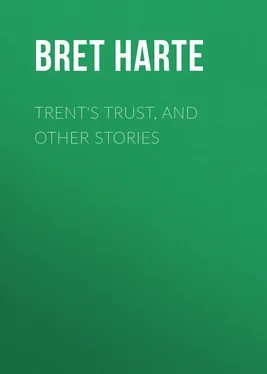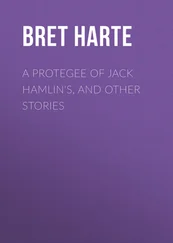Bret Harte - Trent's Trust, and Other Stories
Здесь есть возможность читать онлайн «Bret Harte - Trent's Trust, and Other Stories» — ознакомительный отрывок электронной книги совершенно бесплатно, а после прочтения отрывка купить полную версию. В некоторых случаях можно слушать аудио, скачать через торрент в формате fb2 и присутствует краткое содержание. Издательство: Иностранный паблик, Жанр: foreign_sf, literature_19, foreign_antique, foreign_prose, на английском языке. Описание произведения, (предисловие) а так же отзывы посетителей доступны на портале библиотеки ЛибКат.
- Название:Trent's Trust, and Other Stories
- Автор:
- Издательство:Иностранный паблик
- Жанр:
- Год:неизвестен
- ISBN:нет данных
- Рейтинг книги:5 / 5. Голосов: 1
-
Избранное:Добавить в избранное
- Отзывы:
-
Ваша оценка:
- 100
- 1
- 2
- 3
- 4
- 5
Trent's Trust, and Other Stories: краткое содержание, описание и аннотация
Предлагаем к чтению аннотацию, описание, краткое содержание или предисловие (зависит от того, что написал сам автор книги «Trent's Trust, and Other Stories»). Если вы не нашли необходимую информацию о книге — напишите в комментариях, мы постараемся отыскать её.
Trent's Trust, and Other Stories — читать онлайн ознакомительный отрывок
Ниже представлен текст книги, разбитый по страницам. Система сохранения места последней прочитанной страницы, позволяет с удобством читать онлайн бесплатно книгу «Trent's Trust, and Other Stories», без необходимости каждый раз заново искать на чём Вы остановились. Поставьте закладку, и сможете в любой момент перейти на страницу, на которой закончили чтение.
Интервал:
Закладка:
II
The opinion of the cynical bystander on the wharf proved to be a correct one. The coroner’s jury brought in the usual verdict of “Found drowned,” which was followed by the usual newspaper comment upon the insecurity of the wharves and the inadequate protection of the police.
Randolph Trent read it with conflicting emotions. The possibility he had conceived of the corpse being that of his benefactor was dismissed when he had seen its face, although he was sometimes tortured with doubt, and a wonder if he might not have learned more by attending the inquest. And there was still the suggestion that the mysterious disappearance might have been accomplished by violence like this. He was satisfied that if he had attempted publicly to identify the corpse as his missing friend he would have laid himself open to suspicion with a story he could hardly corroborate.
He had once thought of confiding his doubts to Mr. Revelstoke, the bank president, but he had a dread of that gentleman’s curt conclusions and remembered his injunction to “hang on to his trust.” Since his installation, Mr. Revelstoke had merely acknowledged his presence by a good-humored nod now and then, although Randolph had an instinctive feeling that he was perfectly informed as to his progress. It was wiser for Randolph to confine himself strictly to his duty and keep his own counsel.
Yet he was young, and it was not strange that in his idle moments his thoughts sometimes reverted to the pretty girl he had seen on the night of his arrival, nor that he should wish to parade his better fortune before her curious eyes. Neither was it strange that in this city, whose day-long sunshine brought every one into the public streets, he should presently have that opportunity. It chanced that one afternoon, being in the residential quarter, he noticed a well-dressed young girl walking before him in company with a delicate looking boy of seven or eight years. Something in the carriage of her graceful figure, something in a certain consciousness and ostentation of coquetry toward her youthful escort, attracted his attention. Yet it struck him that she was neither related to the child nor accustomed to children’s ways, and that she somewhat unduly emphasized this to the passers-by, particularly those of his own sex, who seemed to be greatly attracted by her evident beauty. Presently she ascended the steps of a handsome dwelling, evidently their home, and as she turned he saw her face. It was the girl he remembered. As her eye caught his, he blushed with the consciousness of their former meeting; yet, in the very embarrassment of the moment, he lifted his hat in recognition. But the salutation was met only by a cold, critical stare. Randolph bit his lip and passed on. His reason told him she was right, his instinct told him she was unfair; the contradiction fascinated him.
Yet he was destined to see her again. A month later, while seated at his desk, which overlooked the teller’s counter, he was startled to see her enter the bank and approach the counter. She was already withdrawing a glove from her little hand, ready to affix her signature to the receipted form to be proffered by the teller. As she received the gold in exchange, he could see, by the increased politeness of that official, his evident desire to prolong the transaction, and the sidelong glances of his fellow clerks, that she was apparently no stranger but a recognized object of admiration. Although her face was slightly flushed at the moment, Randolph observed that she wore a certain proud reserve, which he half hoped was intended as a check to these attentions. Her eyes were fixed upon the counter, and this gave him a brief opportunity to study her delicate beauty. For in a few moments she was gone; whether she had in her turn observed him he could not say. Presently he rose and sauntered, with what he believed was a careless air, toward the paying teller’s counter and the receipt, which, being the last, was plainly exposed on the file of that day’s “taking.” He was startled by a titter of laughter from the clerks and by the teller ironically lifting the file and placing it before him.
“That’s her name, sonny, but I didn’t think that you’d tumble to it quite as quick as the others. Every new man manages to saunter round here to get a sight of that receipt, and I’ve seen hoary old depositors outside edge around inside, pretendin’ they wanted to see the dep, jest to feast their eyes on that girl’s name. Take a good look at it and paste a copy in your hat, for that’s all you’ll know of her, you bet. Perhaps you think she’s put her address and her ‘at home’ days on the receipt. Look hard and maybe you’ll see ‘em.”
The instinct of youthful retaliation to say he knew her address already stirred Randolph, but he shut his lips in time, and moved away. His desk neighbor informed him that the young lady came there once a month and drew a hundred dollars from some deposit to her credit, but that was all they knew. Her name was Caroline Avondale, yet there was no one of that name in the San Francisco Directory.
But Randolph’s romantic curiosity would not allow the incident to rest there. A favorable impression he had produced on Mr. Dingwall enabled him to learn more, and precipitated what seemed to him a singular discovery. “You will find,” said the deputy manager, “the statement of the first deposit to Miss Avondale’s credit in letters in your own department. The account was opened two years ago through a South American banker. But I am afraid it will not satisfy your curiosity.” Nevertheless, Randolph remained after office hours and spent some time in examining the correspondence of two years ago. He was rewarded at last by a banker’s letter from Callao advising the remittance of one thousand dollars to the credit of Miss Avondale of San Francisco. The letter was written in Spanish, of which Randolph had a fair knowledge, but it was made plainer by a space having been left in the formal letter for the English name, which was written in another hand, together with a copy of Miss Avondale’s signature for identification—the usual proceeding in those early days, when personal identification was difficult to travelers, emigrants, and visitors in a land of strangers.
But here he was struck by a singular resemblance which he at first put down to mere coincidence of names. The child’s photograph which he had found in the portmanteau was taken at Callao. That was a mere coincidence, but it suggested to his mind a more singular one—that the handwriting of the address was, in some odd fashion, familiar to him. That night when he went home he opened the portmanteau and took from the purse the scrap of paper with the written address of the bank, and on comparing it with the banker’s letter the next day he was startled to find that the handwriting of the bank’s address and that in which the girl’s name was introduced in the banker’s letter were apparently the same. The letters in the words “Caroline” and “California” appeared as if formed by the same hand. How this might have struck a chirographical expert he did not know. He could not consult the paying teller, who was supposed to be familiar with signatures, without exposing his secret and himself to ridicule. And, after all, what did it prove? Nothing. Even if this girl were cognizant of the man who supplied her address to the Callao banker two years ago, and he was really the missing owner of the portmanteau, would she know where he was now? It might make an opening for conversation if he ever met her familiarly, but nothing more. Yet I am afraid another idea occasionally took possession of Randolph’s romantic fancy. It was pleasant to think that the patron of his own fortunes might be in some mysterious way the custodian of hers. The money was placed to her credit—a liberal sum for a girl so young. The large house in which she lived was sufficient to prove to the optimistic Randolph that this income was something personal and distinct from her family. That his unknown benefactor was in the habit of mysteriously rewarding deserving merit after the fashion of a marine fairy godmother, I fear did not strike him as being ridiculous.
Читать дальшеИнтервал:
Закладка:
Похожие книги на «Trent's Trust, and Other Stories»
Представляем Вашему вниманию похожие книги на «Trent's Trust, and Other Stories» списком для выбора. Мы отобрали схожую по названию и смыслу литературу в надежде предоставить читателям больше вариантов отыскать новые, интересные, ещё непрочитанные произведения.
Обсуждение, отзывы о книге «Trent's Trust, and Other Stories» и просто собственные мнения читателей. Оставьте ваши комментарии, напишите, что Вы думаете о произведении, его смысле или главных героях. Укажите что конкретно понравилось, а что нет, и почему Вы так считаете.












